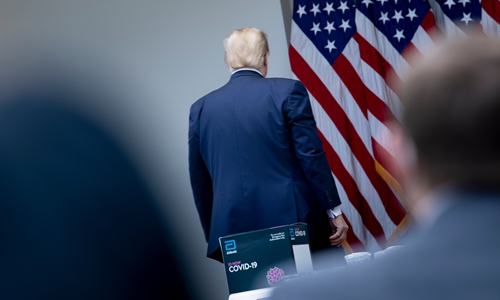Dumbing-down of US shocks world
By Liu Xin and Chen Qingqing Source:Global Times Published: 2020/5/13 22:38:40 Last Updated: 2020/5/13 23:55:03
Washington politicians make life difficult for medical experts: analysts

US President Donald Trump leaves a news conference on the novel coronavirus, COVID-19, in the Rose Garden of the White House in Washington, DC on May 11, 2020. Photo: AFP
Top US infectious disease expert Dr. Anthony Fauci's warning of more COVID-19 deaths and economic damage if the US reopens too soon has sparked a backlash from US politicians eager to revive the flailing economy. Experts said Fauci, together with other scientists who work for the US government, can hardly focus on the coronavirus control work as they have been dragged into endless political dramas, and the Trump administration has given less respect to expertise, which would lead to greater tragedy in dealing with the pandemic.
As the director of the National Institute of Allergy and Infectious Diseases, Fauci warned at a Senate committee hearing on Tuesday that American cities and states could "turn back the clock" and see more deaths and economic damage if they lift the stay-at-home restrictions too fast. He also said that coronavirus deaths in the US are undercounted.
Although Fauci did not mention President Donald Trump by name at Tuesday's hearing, his testimony undermined Trump's recent downplay of the pandemic and attempt to lift stay-at-home restrictions, experts said.
There is a rising conflict in the US between political priorities and scientific advice. Many politicians, not least the President himself, have been eager to downplay scientific advice in the push to reopen the economy, Tom Fowdy, a British political and international relations analyst, told the Global Times on Wednesday.
It is obvious that the Trump administration has contempt for science and is not willing to implement all of the measures necessary to contain the spread of the virus, but prefers to rush to end the lockdown to save the economy, Fowdy said.
Growing anti-intellectualism
The rise of anti-intellectualism in the US is one of the reasons behind the Trump administration's low respect for expertise, which has caused the failure of the US virus control, experts said.
Trump's election as US President was the result of populism in the US, and many of his core supporters are not well-educated. Trump's remarks and tweets, which usually use simple words, show that he wants to cater to his base, and Trump himself also has little respect for intellectuals and science, Sun Chenghao, an assistant research fellow at the Institute of American Studies of the China Institutes of Contemporary International Relations, told the Global Times.
Experts and professionals in the US had given abundant scientific advice to control the virus. But Trump also came up with advice at his press conferences which usually contradicted the experts. This caused confusion and did no good to helping control the pandemic, Sun said.
US professionals who are supposed to give scientific advice are busy dismissing misinformation released by the president, experts noted. For example, during a press conference in March, Fauci contradicted Trump's assertion that an anti-malaria drug could work against the coronavirus.
Anti-intellectualism among Americans also hindered the country's fight against COVID-19. Video circulating online shows protesters holding signs calling COVID-19 "a hoax," with a crowd shouting, "Arrest Bill Gates!" And some drank or injected disinfectants as Trump suggested at a press conference. These have shifted society's focus from solving the real problem, experts said.
Overseas Chinese living in the US reached by the Global Times on Wednesday, said they were also stunned by some abnormal behaviors in the US during the pandemic.
A Chinese woman, surnamed Chen, who has lived in New York for more than two years, said that many Chinese have stayed at home as required and wear masks at the early stage when going outside.
However, there are also people paying no attention to the stay-at-home order. Many Republic supporters, who are from the lower and middle class and have limited education, could be more easily affect by the pandemic and have abnormal behaviors, she said.
A Chinese man surnamed Deng who works at a furniture design company in San Francisco said he does not understand why so few Americans would wear masks when they go out and why not listen to professional advices.
"They are blindly overconfident," he said, noting that he couldn't understand those irrational remarks and actions by the US officials.
Experts and Chinese living in the US also expressed concerns over Trump and some politicians' push for economy reopening, saying that instead of relying on advices from experts, decisions out of political purpose for work resumption may lead to more infections and deaths.
Some US medical staff and experts have been harshly criticizing the White House's rejection of US CDC suggestions to safely reopen the economy. Craig Spencer, a New York-based ER doctor, said in a recent tweet that governors created their own criteria, with many based more on politics than public health. "This is why we worry!" he said.
Spencer has been sharing his experiences dealing with coronavirus over the past few months on social networks, including views on testing and treatment. On May 4, he said his followers have surpassed 100,000, as "people want honest insights from physicians, public health professions and scientists."
Aside from medical staff, The New York Times' science and health reporter, Donald G. McNeil Jr., told CNN recently that the US only had itself to blame for a woeful response to the coronavirus outbreak. He also called on the director of the Centers for Disease Control and Prevention to quit.
"It is the president's fault. It is not China's fault," the reporter said. The New York Times criticized the report and said he "went too far."
Posted in: DIPLOMACY